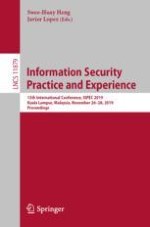2019 | OriginalPaper | Buchkapitel
GDPR-Compliant Reputation System Based on Self-certifying Domain Signatures
verfasst von : Mirosław Kutyłowski, Jakub Lemiesz, Marta Słowik, Marcin Słowik, Kamil Kluczniak, Maciej Gebala
Erschienen in: Information Security Practice and Experience
Aktivieren Sie unsere intelligente Suche, um passende Fachinhalte oder Patente zu finden.
Wählen Sie Textabschnitte aus um mit Künstlicher Intelligenz passenden Patente zu finden. powered by
Markieren Sie Textabschnitte, um KI-gestützt weitere passende Inhalte zu finden. powered by
